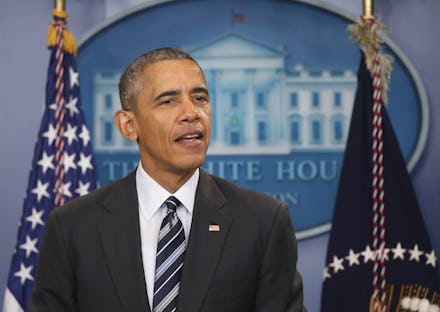Obama Just Announced an $11 Billion Plan for Ending Family Homelessness

The typical image of the suffering of the homeless is that of a haggard man, alone, often reeling from addiction or never fully recovered from the trauma of war. But many of those who become homeless are in fact families with children who are barely making ends meet one day, then on the streets the next.
President Barack Obama proposed a funding package to address their unique plight in his fiscal year 2017 budget request, which the White House unveiled on Tuesday. In the proposal, Obama calls on Congress to apportion $11 billion over the next 10 years to tackle the problem of homelessness among families with young children, with the goal of ending homelessness among families by 2020. News of the request was first reported by the New York Times on Monday.
Just as important as the total amount is the breakdown of how those funds would be spent: According to the Times, $8.8 billion would go to housing vouchers — rental assistance that helps low-income families with housing payments — and $2.2 billion for short-term assistance.
The Times reported that an estimated 64,000 families, including 123,000 children, are homeless in the United States.
The lion's share of the proposed funding comes in the form of rental assistance because the most effective anti-homelessness policies aim to prevent people from becoming homeless in the first place. Focusing on making housing more accessible has been shown to be more cost-effective and better for maintaining social stability than pouring more money into shelters and soup kitchens.
The big picture: The Obama administration has had enormous success with reducing the rate of homelessness among veterans, a policy victory that has driven home the broader importance of focusing on housing as a tool of empowerment.
Through coordination with state and local governments and networks of nonprofit organizations, the White House has overseen a 50% plunge in veteran homelessness over the past four years. In an interview with Mic in November, Secretary of Housing and Urban Development Julian Castro said that focusing on providing housing for those in need is often a prerequisite for them to be able to take control of their lives.
"The fascinating thing about housing-first is that it flipped the usual dynamic of public policy," Castro told Mic. "The usual dynamic of public policy is that we expect responsibility from someone, and then we give them an opportunity. Here we give them the opportunity of permanent housing right away, and that allows them to help take the responsibility necessary to improve their lives — to address their employment situation, to address a mental health challenge or addiction that they have."
Addressing homelessness for families presents different challenges. While veterans are more likely to become homeless due to mental health and substance abuse issues, housing experts attribute the persistence of homelessness among families to a blend of stagnant wages and soaring housing costs.
The problem is especially acute in affluent cities, where a scarcity of affordable housing has helped generate serious crises for the less secure. In September Los Angeles became the first city in the nation to declare a public emergency over the number of homeless people on its streets. New York City has seen a dramatic spike in the number of homeless people in its shelters and on its streets in recent years. (In fact, the city's uninhabitability for the poor is the main reason that New York state claims a quarter of homeless families nationwide.)
It remains to be seen if the amount the White House has allocated for helping low-income families avoid homelessness will be enough. But at the moment there's little reason to think that the structural problems contributing to stagnant wages and the affordable housing crisis are going away anytime soon.